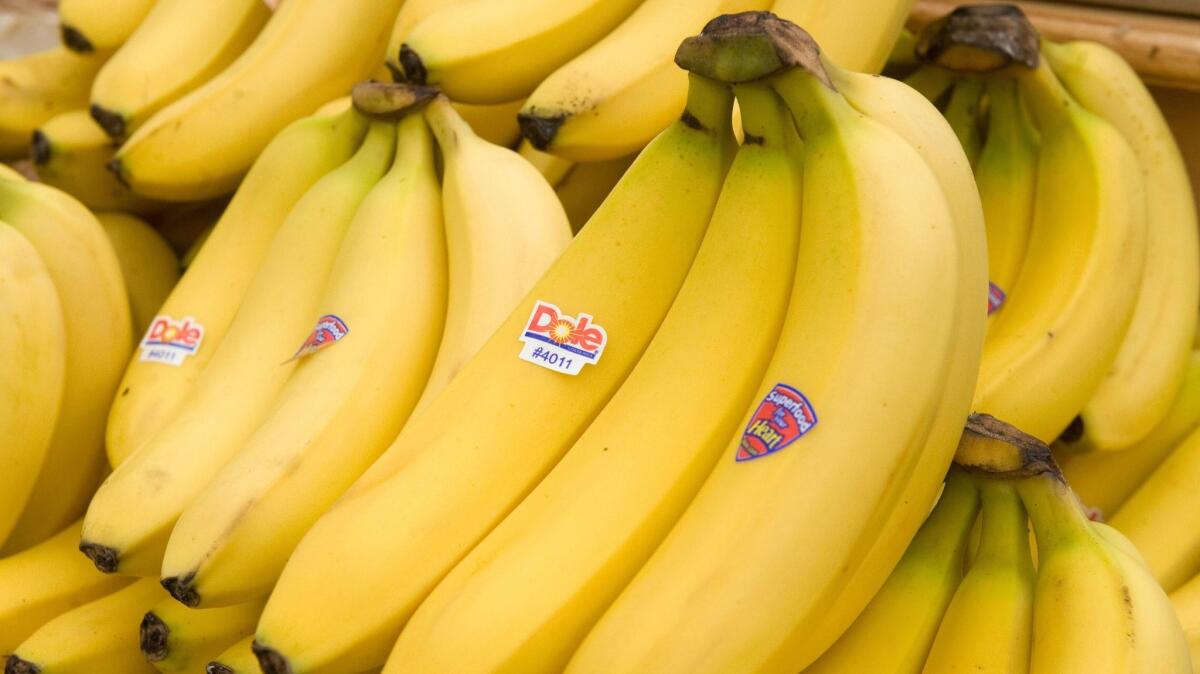Dole files for initial public offering — for the third time

- Share via
Less than four years after its billionaire chairman, David H. Murdock, took Dole Food Co. private — and snookered investors in the process, a judge said — the company is once again planning to tap the public markets.
The Westlake Village fruit and vegetable company, controlled by the 94-year-old Los Angeles-area resident since 1985, outlined its intentions for another initial public offering in a regulatory filing this week.
Murdock took the company private in 2003, then public in 2009, then private again in a $1.2-billion deal in 2013.
The Securities and Exchange Commission filing does not provide some key details of the offering, including how much Dole hopes to raise, but it does offer a glimpse at how the company has fared since Murdock last took it private.
Since 2013, the company acquired several farms, mostly in Central and South America, while selling off unused land in Hawaii and a fruit distribution business in Sweden.
Those moves, the company reports, have made it more profitable on an operating basis. The company’s earnings before interest payments, taxes, depreciation and other costs were $215.6 million last year, up more than $100 million compared with 2013.
Still, the company has not been profitable on a net income basis since 2014 because of expenses related to a product recall and legal costs. It lost $10.8 million in 2015 and $23 million last year.
A recall of tainted salads cost it $25.5 million last year, and it paid more than $150 million over the last two years to settle investor lawsuits filed after Murdock last took the company private.
In 2013, Murdock agreed to pay $1.2 billion, or $13.50 a share, for the 60% of Dole he didn’t own already. Though the deal was approved by the company’s board and shareholders, some investors sued, saying the price undervalued the company.
In 2015, a Delaware judge found that Murdock and former Dole executive C. Michael Carter had defrauded the company’s board in order to sell the company for less than it was worth.
Specifically, court Vice Chancellor J. Travis Laster said that Carter gave Murdock an accurate estimate — but the board a lowball one — of the savings associated with a 2012 deal in which Dole sold operations in Asia. That deprived the board and shareholders of information they needed to determine a fair price.
Laster’s opinion said Murdock and Carter should personally pay $148 million to investors, though, according to Dole’s latest filing, no judgment was finalized because Dole and Murdock reached a settlement with investors.
The company ended up paying $82.4 million in that case, and Murdock also made a settlement payment, though the filing does not specify how much. The company also paid $74 million to settle a separate class-action case, filed in 2015, related to the same alleged wrongdoing.
Dole executives declined to comment, citing a quiet period ahead of the company’s planned offering.
Lloyd Greif, chief executive of downtown L.A. investment bank Greif & Co., said that after 2013’s deal, investors are likely to approach Dole with caution, especially because Murdock, according to the latest filing, intends to own a controlling stake in the company.
“I think people are going to look very carefully at corporate governance here,” Greif said. “The question is, how strong is the board and how independent is the board?”
For now, the board is made up of Murdock, Wells Fargo banker Janine Peck and former Dole executive Roberta Wieman, also a member of Dole’s board when it was a private company between 2003 and 2009.
Murdock, who Forbes estimated is worth $2.7 billion, is a health-food advocate who has promoted a mostly vegetarian diet since the death of his third wife in 1985, something he has attributed to the couple’s heavy diet of greasy food and red meat.
Though Murdock has publicly pronounced plans to live to 125, Greif said he imagines this will be the last big change in Dole’s ownership under the nonagenarian’s watch.
“One thing you can probably take to the bank is that he won’t be doing another go-private transaction,” Greif said. “I think there’s a good shot he makes it to his centennial birthday. Making it to 125 would be an impressive feat, but nobody in the stock market is betting on that.”
Follow me: @jrkoren
More to Read
Inside the business of entertainment
The Wide Shot brings you news, analysis and insights on everything from streaming wars to production — and what it all means for the future.
You may occasionally receive promotional content from the Los Angeles Times.











